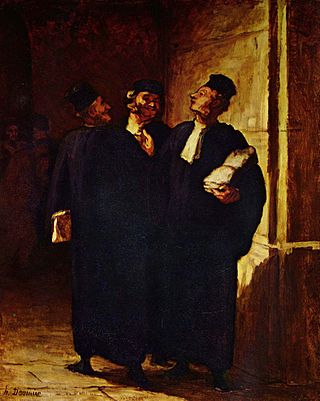
A barrister is a type of lawyer in common law jurisdictions. Barristers mostly specialise in courtroom advocacy and litigation. Their tasks include arguing cases in courts and tribunals, drafting legal pleadings, researching the law and giving legal opinions.

A lawyer is a person who practices law. The role of a lawyer varies greatly across different legal jurisdictions. A lawyer can be classified as an advocate, government lawyer, attorney, barrister, canon lawyer, civil law notary, counsel, counselor, solicitor, legal executive, or public servant — with each role having different functions and privileges. Working as a lawyer generally involves the practical application of abstract legal theories and knowledge to solve specific problems. Some lawyers also work primarily in advancing the interests of the law and legal profession.

An advocate is a professional in the field of law. Different countries' legal systems use the term with somewhat differing meanings. The broad equivalent in many English law–based jurisdictions could be a barrister or a solicitor. However, in Scottish, Manx, South African, Italian, French, Spanish, Portuguese, Scandinavian, Polish, Israeli, South Asian and South American jurisdictions, "advocate" indicates a lawyer of superior classification.
A solicitor is a legal practitioner who traditionally deals with most of the legal matters in some jurisdictions. A person must have legally-defined qualifications, which vary from one jurisdiction to another, to be described as a solicitor and enabled to practise there as such. For example, in England and Wales a solicitor is admitted to practise under the provisions of the Solicitors Act 1974. With some exceptions, practising solicitors must possess a practising certificate. There are many more solicitors than barristers in England; they undertake the general aspects of giving legal advice and conducting legal proceedings.

In the United Kingdom and some Commonwealth countries, a King's Counsel is a senior trial lawyer appointed by the monarch of the country as a 'Counsel learned in the law'. When the reigning monarch is a woman, the title is called Queen's Counsel.
The call to the bar is a legal term of art in most common law jurisdictions where persons must be qualified to be allowed to argue in court on behalf of another party and are then said to have been "called to the bar" or to have received "call to the bar". "The bar" is now used as a collective noun for barristers, but literally referred to the wooden barrier in old courtrooms, which separated the often crowded public area at the rear from the space near the judges reserved for those having business with the court. Barristers would sit or stand immediately behind it, facing the judge, and could use it as a table for their briefs.

Baron Gifford, of St Leonard's in the County of Devon, is a title in the Peerage of the United Kingdom. It was created on 30 January 1824 for the lawyer Sir Robert Gifford, who later served as Master of the Rolls. His grandson, the third Baron, was a soldier and colonial administrator and was awarded the Victoria Cross in 1874. On his death the title passed to his younger brother, the fourth Baron, and then to their nephew, the fifth Baron. As of 2010 the title is held by the latter's son, the sixth Baron, who succeeded in 1961. He is a barrister.
A counsel or a counsellor at law is a person who gives advice and deals with various issues, particularly in legal matters. It is a title often used interchangeably with the title of lawyer.
Michael Fox may refer to:
Suhrawardi or Sohrevardi or variants may refer to:
Edward James (1907–1984) was a British poet and art patron.
Peter Graham may refer to:
Edwin James may refer to:
Richard Stephens may refer to:
Frank Cooke may refer to:
Lord Anderson may refer to:
Jon or Jonathan Cooper may refer to:
This page is based on this
Wikipedia article Text is available under the
CC BY-SA 4.0 license; additional terms may apply.
Images, videos and audio are available under their respective licenses.




